Established 2023
Howard Housel, A Respectful Poet Who Loved Baseball
Monday, November 11, 2024
Youbin Park

Click on different bases to learn more about Howard Housel
First Base: Background & Incarceration
Second Base: "You will be Glad"
Third Base: "Hustling Ball Players"
Home Base: Life After Eastern State Penitentiary
First Base: Background & Incarceration
Howard Otis Housel, better known as Inmate B-6861 in the Eastern State Penitentiary, was an inmate that was imprisoned from 1913 to 1916. During his time in the Eastern State Penitentiary, he published one piece of advice and a poem, showing that he was an active writer in the prison. Howard Otis Housel was born on March 22, 1887 in Trenton, New Jersey and the record indicates that he received 12 years of education, which was not common during the 1890s when the percentage of 17 year olds that graduated from high school was around 3.5%. [1] This level of literacy allowed Housel to actively publish his writing in the Umpire, a newspaper published in the Eastern State Penitentiary. He was sentenced to two years and six months along with a fine of $1.00 for uttering a forgery. Though the document he forged remains unclear, it is possible that his high level of literacy played a huge role in a forgery. Since many other people were illiterate during the late 19th century, he could have used his high level of literacy to his own advantage to deceive the public.
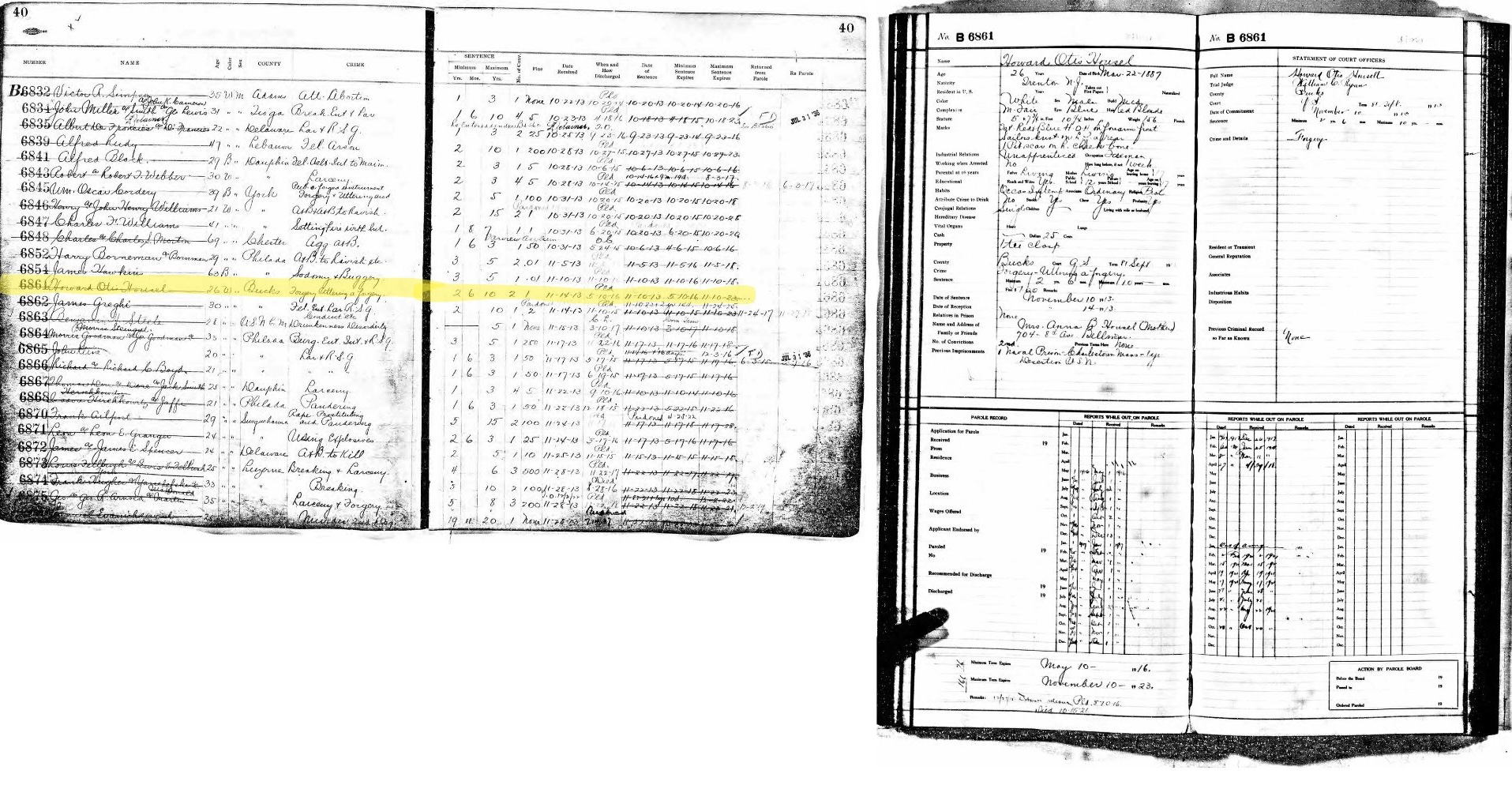
While the records of his activities in prison are limited, we can peek into part of his story through several publications in the Umpire. His writings, which will be discussed in You will be Glad and Hustling Ball Players, indicate that he had a good relationship with other inmates and loved to play baseball in the prison. Additionally, The Umpire included a section for inmates to sell items, where Housel listed a “17-ribbed, 8-string mandolin, worth $7.50, for $2.50,” noting he was selling it because he would soon be released. Possessing musical instrument during his imprisonment demonstrates his involvement in musical activities in the ESP. Especially, $7.50 during his time is equivalent to about $225 in current values [2] and his keeping of high-priced instrument in the prison reflects his passion for music. It is also possible that he may have been part of a musical group in the ESP as the inmates “formed jazz and country bands, orchestras and choirs, penning original compositions and performing in holiday concerts broadcast on the radio.” [3] Mandolin, one of the pivotal instruments for country music, suggests Housel may have kept it with hopes of joining a country band.

Second Base: You Will Be Glad
YOU WILL BE GLAD
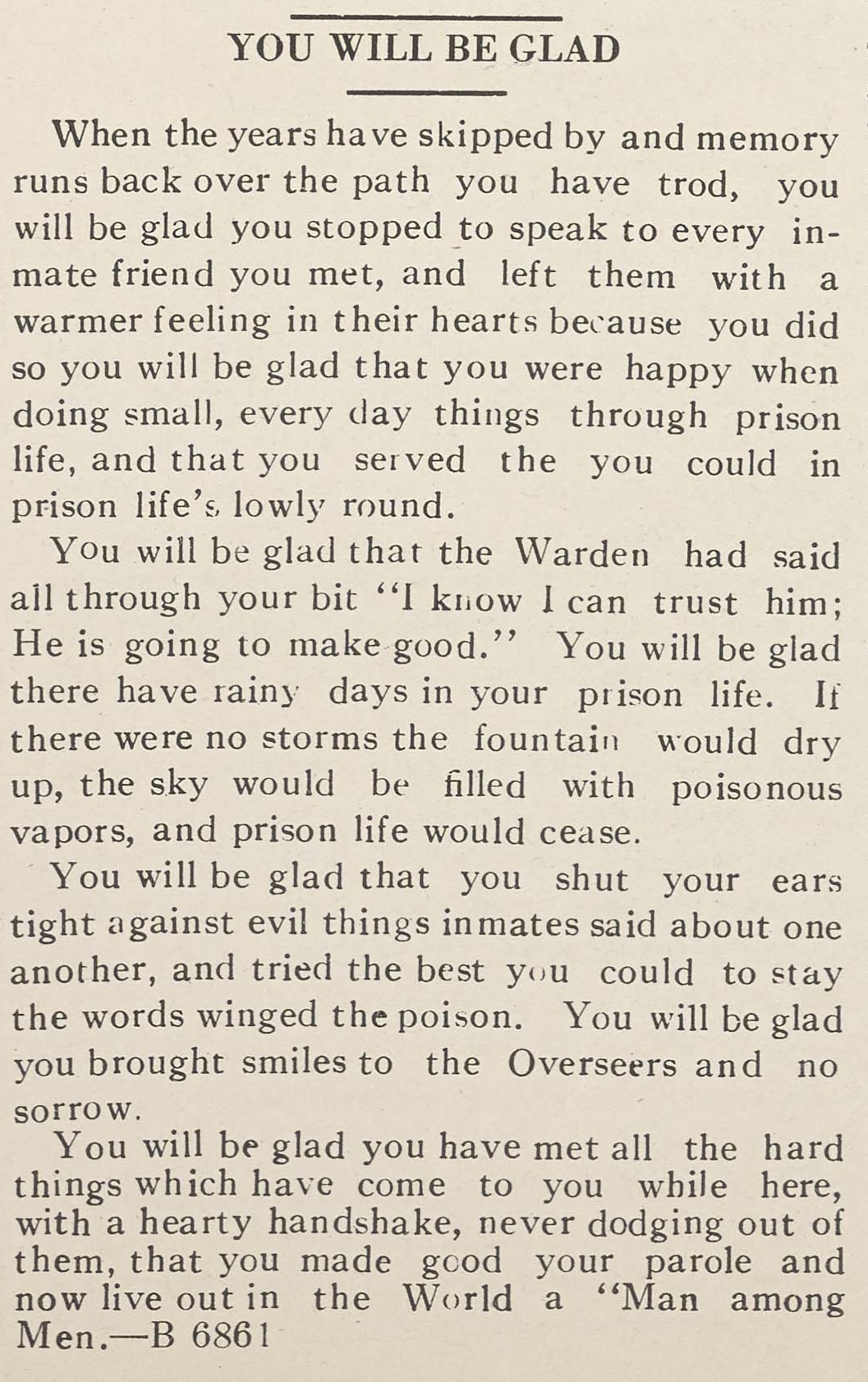
When the years have skipped by and memory runs back over the path you have trod, you will be glad you stopped to speak to every inmate friend you met, and left them with a warmer feeling in their hearts because you did so. You will be glad that you were happy when doing small, everyday things through prison life, and that you served as best as you could in prison life's lowly round.
You will be glad that the Warden had said all through your bit, "I know I can trust him; He is going to make good." You will be glad there have been rainy days in your prison life. If there were no storms, the fountain would dry up, the sky would be filled with poisonous vapors, and prison life would cease.
You will be glad that you shut your ears tight against evil things inmates said about one another, and tried the best you could to stay the words winged with poison. You will be glad you brought smiles to the Overseers and no sorrow.
You will be glad you have met all the hard things which have come to you while here with a hearty handshake, never dodging out of them, that you made good your parole, and now live out in the World a "Man among Men." — B 6861
This short advice is directed to the other prisoners in the Eastern State Penitentiary, almost as his farewell remarks before he leaves the prison. His advice serves as crucial evidence that provides insight into what his life in prison was like. His advice comes from his own experience and the personal insight gained from the imprisonment. The publication also reveals his desire to draw meanings out from the hardships in prison life. His repetition of synonyms to positive words reveal that Housel views hardships as essential to personal development, a way to gain positive lessons in life.
His main advice to inmates include talking to every inmate, being a trustworthy inmate to the warden, and staying away from evil things. The pride in “making good your parole” indicates that these are all the things that the writer has done during his life in ESP that made him glad. The repeated assurances of future gladness “you will be glad” suggests that Housel believes in the value of small and positive actions. He also includes the compliment from the warden, “I know I can trust him; He is going to make good." to show the trust relationship he built as well as the the happiness that comes from hearing these words from the authority. This advice also serves as a motivation to other inmates; one can walk out from difficult situations with happiness if one treats others with respect and integrity. Although every prisoner had done something wrong in the past, Housel believed in the benevolence that existed in every one of them. Housel reminds everyone that how they behave determines their memories in the prison and that if one behaves with warm-heartedness, then one will be glad to leave prison with good memories.
Also, instead of including his real name as the author, he identifies himself with his prison number in all his publications. This reflects depersonalization that occurs in the Eastern State Penitentiary as all prisoners were called by their prison number in "The Umpire". However, it also acts as a symbol of personal journey in regaining his identity. Although he is identified as B 6861 in the ESP, he hopes to regain his name, Howard Otis Housel, and live in the world a “man among men” once he is released from the prison. He reminds the readers that this is only possible through good actions in the prison, showing his commitment to a new beginning with integrity and renewed purpose.
Back to Baseball MapThird Base: Hustling Ball Players
HUSTLING BALL PLAYERS
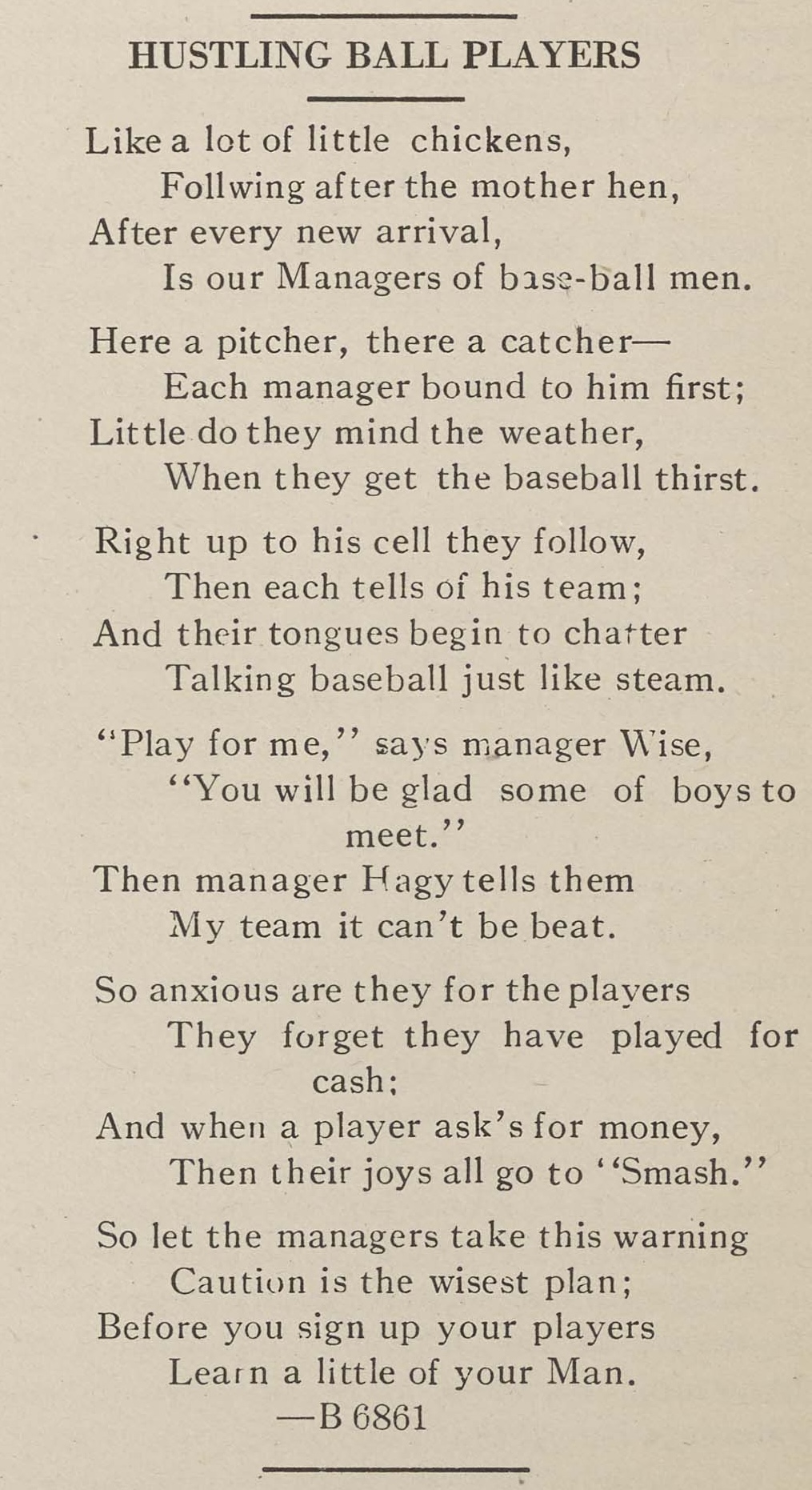
Like a lot of little chickens,
Following after the mother hen,
After every new arrival,
Is our Managers of base-ball men.
Here a pitcher, there a catcher—
Each manager bound to him first;
Little do they mind the weather,
When they get the baseball thirst.
Right up to his cell they follow,
Then each tells of his team;
And their tongues begin to chatter
Talking baseball just like steam.
"Play for me," says manager Wise,
"You will be glad some of the boys to meet."
Then manager Hagy tells them
My team it can't be beat.
So anxious are they for the players
They forget they have played for cash:
And when a player ask's for money,
Then their joys all go "Smash."
So let the managers take this warning
Caution is the wisest plan;
Before you sign up your players
Learn a little of your Man.
—B 6861
As shown in the poem, baseball culture had huge impacts for inmates in the early 20th century. This poem in particular shows the glimpse of baseball culture in the prison as well as Housel’s passion for the ballgame. The poem suggests that inmates formed different baseball teams and even their leagues in the prison. Each team had a manager and were always actively looking for new talented players on the team, primarily by recruiting newly arrived inmates. Housel describes the managers looking for new players humorously by comparing them to “little chickens following after the mother hen” to emphasize the excitement and enthusiasm that inmates had in baseball. The formation of teams and the league further shows how baseball united the prisoners. This unitment under baseball further led them to form Honor and Friendship Club and publish the newspaper "The Umpire" together. Most importantly, baseball broke racial barriers in the prison, in which white and black players were integrated to play in the same team. [4]
The inclusion of dialogue between the two managers, each arguing that their teams are unbeatable, reflect the competitive environment between two baseball teams. The rivalry between the two teams indicates that baseball was not just a way to pass their time. Rather, it was a way to reconnect back to the passion outside of the prison. Despite the lack of monetary compensation, baseball was popular among inmates because of the shift of the value from money to joy as a reward. Not only baseball brought excitement among the inmates but also gave the sense of autonomy and hope of “becoming reintegrated into American society.” [4] With the power to organize the league and teams amongst themselves, the baseball empowered them to “assume authority and responsibility” [4] which were denied in the prison.
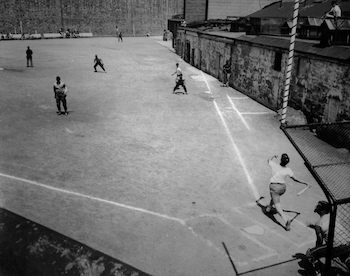
Housel also provides short advice to the managers before he leaves the prison. He warns the managers not to sign anyone randomly but choose a player wisely. He advises that managers should look at the personality of the players and "learn a little of your man" before choosing them into their team. This lines with the advice in the "You Will Be Glad": maintaining good relationships between the inmates. The advice also reveals that Howard himself was also actively involved in the baseball league and shows his passion for the baseball league in the prison, even when he was being released in a few months.
In summary, baseball was a crucial aspect of Eastern State Penitentiary for inmates during the early 20th century, shown through Housel’s passion. Baseball brought excitement, unitement, competitiveness, and a feeling of autonomy to the inmates and acted as an emotional relief to stress of the confinement.
Back to Baseball MapHome Base: Life After Eastern State Penitentiary
It is unclear when he was released but with the selling of mandolin in the March 1916 publication of The Umpire and the minimum sentence being 2 years and 6 months, it can be guessed that he was released on May 10th, 1916.
Despite the limited evidence of his life after Eastern State Penitentiary, his name was found in the local newspaper of New Jersey as one of the men that was enlisted and sent to Camp Greenleaf. He was enlisted to serve in World War I, confirmed by the U.S. World War I Draft Registration Cards written in 1917. His dedication to serve for the nation reflects the change in values after serving his sentence in the Eastern State Penitentiary. As reflected in the “You will be Glad” section, he valued respect and integrity during his imprisonment and his service in World War I well reflects his core values. Perhaps, he believed serving for the nation as a way to compensate for the wrongdoings in the past.
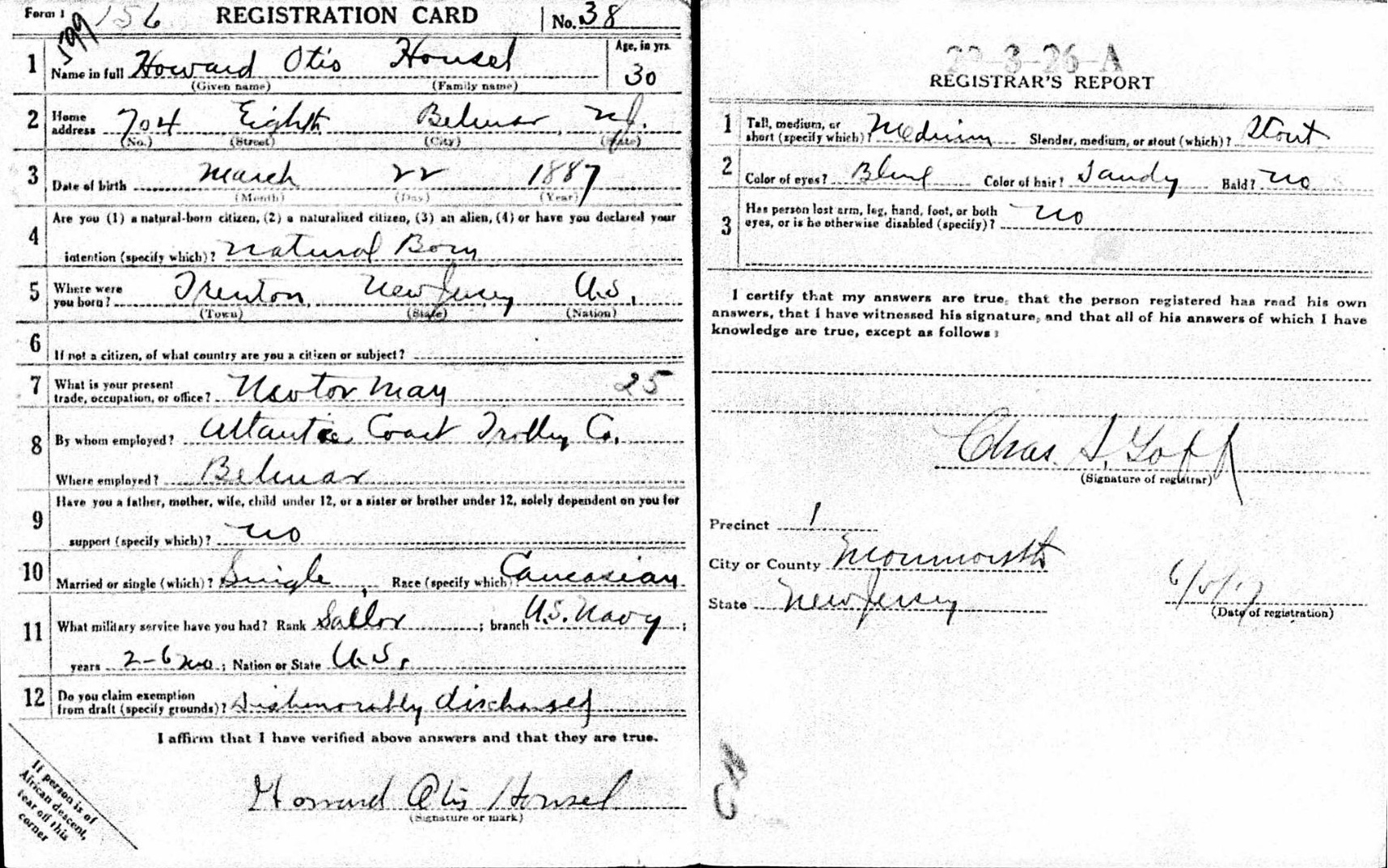
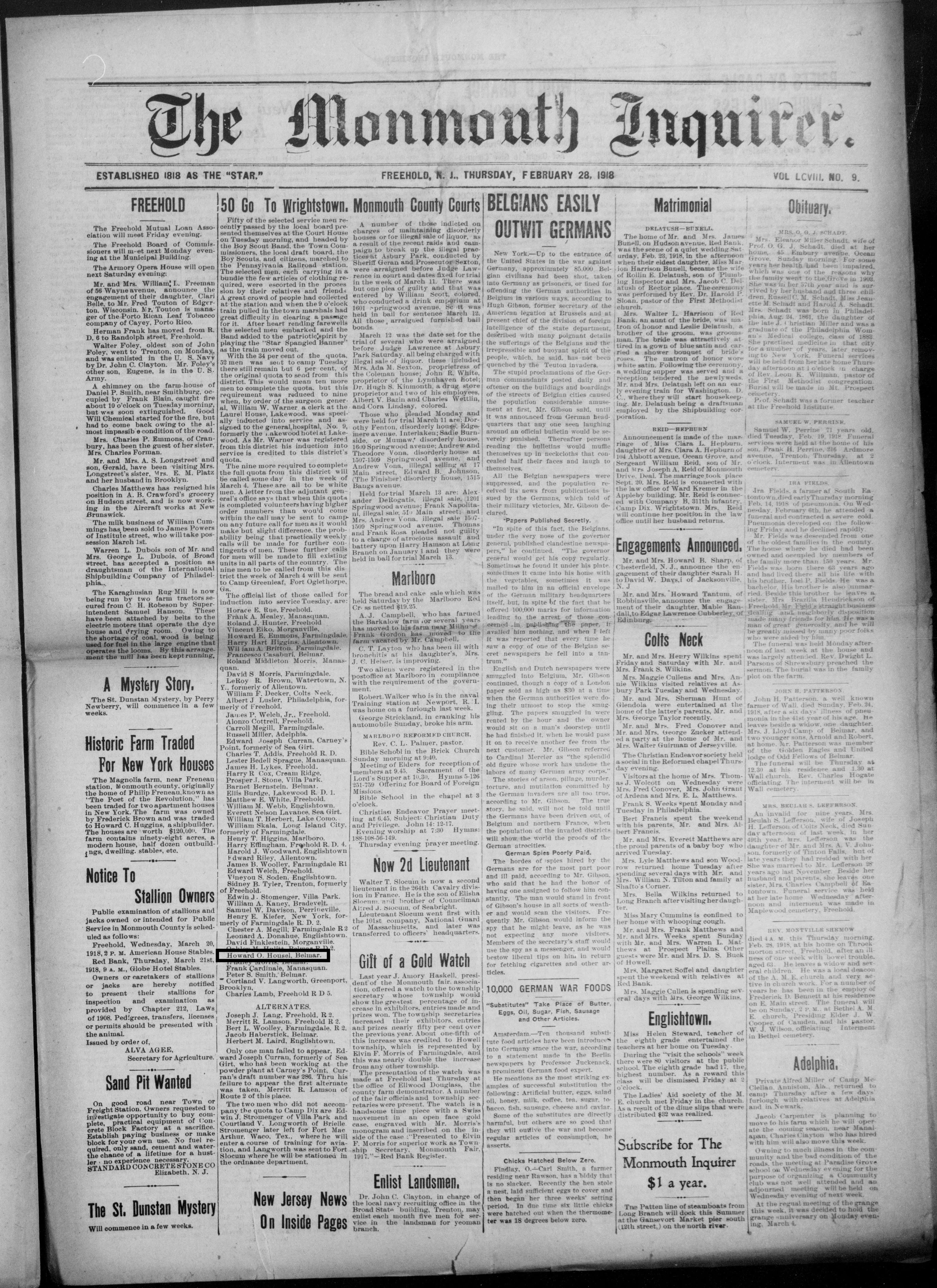
Unfortunately, this is his last record. He died on October 10, 1922 of unknown cause and his graveyard can be found in Neptune Township, New Jersey.
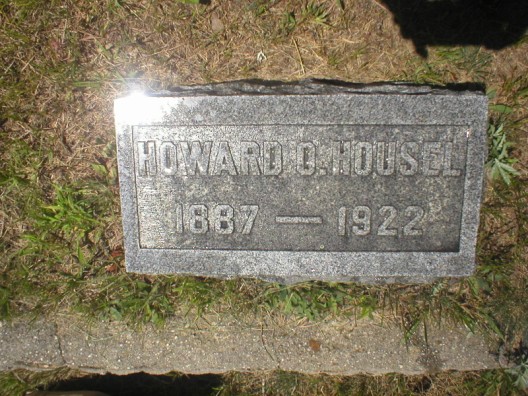
References
- Mintz, Steven. “Statistics: Education in America, 1860-1950.” Statistics: Education in America, 1860-1950 | Gilder Lehrman Institute of American History. Accessed November 11, 2024. https://www.gilderlehrman.org/history-resources/teacher-resources/statistics-education-america-1860-1950
- U.S. Bureau of Labor Statistics. “CPI Inflation Calculator.” U.S. Bureau of Labor Statistics. Accessed November 11, 2024. https://data.bls.gov/cgi-bin/cpicalc.pl?cost1=7.50&year1=191603&year2=202409
- Hunt, Kristin. “Before Eastern State Penitentiary Closed, Music by the Prison’s Inmate Band Delighted Radio Audiences.” PhillyVoice, May 11, 2024. https://www.phillyvoice.com/eastern-state-penitentiary-music-musicians-band-orchestra-philadelphia-radio/
- Hayburn, Tim. “Baseball Behind Bars: Prison Baseball at Eastern State Penitentiary in the Early Twentieth Century.” Journal of Sport History 34, no. 2 (2007): 253–70. http://www.jstor.org/stable/43610019
